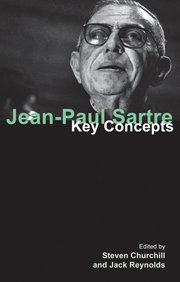Book contents
- Frontmatter
- Contents
- Contributors
- Acknowledgements
- Note on abbreviations
- 1 Introduction: Sartre vivant
- 2 Life and works
- Part I PSYCHOLOGY, PSYCHOANALYSIS AND LITERATURE
- 3 Sartre and Husserl's Ideen: phenomenology and imagination
- 4 Sartre's understanding of the self
- 5 Contingency and ego, intentionality and nausea
- 6 Sartre: novelist and playwright
- 7 Psychoanalysis and existential psychoanalysis
- Part II ONTOLOGY: FREEDOM, AUTHENTICITY AND SELF-CREATION
- Part III ETHICS AND POLITICS
- Bibliography
- Index
6 - Sartre: novelist and playwright
from Part I - PSYCHOLOGY, PSYCHOANALYSIS AND LITERATURE
- Frontmatter
- Contents
- Contributors
- Acknowledgements
- Note on abbreviations
- 1 Introduction: Sartre vivant
- 2 Life and works
- Part I PSYCHOLOGY, PSYCHOANALYSIS AND LITERATURE
- 3 Sartre and Husserl's Ideen: phenomenology and imagination
- 4 Sartre's understanding of the self
- 5 Contingency and ego, intentionality and nausea
- 6 Sartre: novelist and playwright
- 7 Psychoanalysis and existential psychoanalysis
- Part II ONTOLOGY: FREEDOM, AUTHENTICITY AND SELF-CREATION
- Part III ETHICS AND POLITICS
- Bibliography
- Index
Summary
Sartre the novelist
Sartre began his career as a novelist in 1938 with Nausea, and ended it with the third volume of the Roads to Freedom series (Sartre 1949a), as well as fragments of a fourth volume (posthumously published as The Last Chance; Sartre 1981a, 2009). In 1940, as a prisoner-of-war in Trier, Germany, Sartre wrote (and performed in) his first play, a Christmas mystery called Bariona, or the Son of Thunder (Sartre 1962b); he ended his playwriting career in 1965 with his adaptation of Euripides's The Trojan Women.
Nausea is a perfect illustration of Fernandez's conception of the novel “as unfolding in the present, as does life itself” (Sartre 1947a: 15). Events in this diary unfold in a discontinuous, haphazard manner, and Roquentin, the solitary narrator, adopts it “in order to see more clearly” (Sartre 1981a: 5). Its core passage “In the Public Park” illustrates Roquentin's experience of contingency, and, since it takes place towards the end of the novel, it requires that one keep this revelation constantly in mind if one wishes to arrive at a proper interpretation. Roquentin discovers that the “essential is contingency”, that it is “the absolute … or the absurd”, and that the universe is “perfectly gratuitous” (ibid.: 153–5). As a result, he views most human endeavours as pathetic attempts to disguise reality and to obscure, or embellish and prettify man's real position in the world. This applies to such arts as novel-writing, sculpture, architecture, theatre.
- Type
- Chapter
- Information
- Jean-Paul SartreKey Concepts, pp. 66 - 75Publisher: Acumen PublishingPrint publication year: 2013

